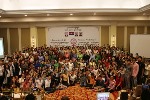Social Watch E-Newsletter - Issue 202 - February 13, 2015
Published on Fri, 2015-02-13 10:02
 |
| Issue 202 - February 13, 2015 |
|
|
|
| |
| |
|
| |
FfD3: Common but Differentiated Responsibilities, a common but misunderstood principle
|
| |
|
| |
 |
Roberto Bissio, Coordinator of Social Watch, said that developed countries that have a major share in the historic responsibility of filling the atmosphere with human-generated emissions of carbon dioxide since the start of the industrial revolution, two centuries ago, are expected by the climate convention of the UN to have a greater responsibility.
Manuel F Montes, Senior Advisor on Finance and Development of The South Centre, said that even when he does not know how long it took diplomats in 1992 to arrive at the CBDR formulation it is an accurate shorthand characterization of the balance of responsibilities in the climate change framework. It is not true that developing countries do not have obligations in the climate change treaty. Developing countries have obligations under the convention but “[T] The extent to which developing country Parties will effectively implement their commitments under the Convention will depend on the effective implementation by developed country Parties of their commitments under the Convention related to financial resources and transfer of technology and will take fully into account that economic and social development and poverty eradication are the first and overriding priorities of the developing country Parties” (United Nations 1992, paragraph 4.7).
Bissio and Montes participated as speakers in a side-event co-organized by the Permanent Mission of Brazil to the UN, CIDSE and Social Watch on Thursday, January 29, 2015 in the UN Conference Building, New York. Dealing with responsibilities in a financing sustainable development context, this event generated discussion on conceptual challenges such as an evenhanded approach to the three pillars of sustainable development, adapting a framework like the Financing for Development process to the universal agenda of the Sustainable Development Goals without denaturalizing and decontextualizing it and how to incorporate important principles agreed at the UN Conference on Sustainable Development.
Read Mr. Bissio intervention here and Mr. Montes intervention here.
|
| |
|
| |
|
| |
Human rights obligations frame States' choices in lead up to Financing for Development |
| |
|
| |
In a new document entitled “Key messages on Human Rights and Financing for Development” the Office of the High Commissioner for Human Rights (OHCHR) teased out several implications of the human rights legal framework for the Financing for Development Conference.
Negotiations towards the adoption of an Outcome Document for the Third International Conference on Financing for Development (FfD), to be held on 13 to 16 July in Addis Ababa, Ethiopia, are already underway. The Conference is mandated to assess progress, made in the implementation of the Monterrey Consensus and the Doha Declaration (on Financing for Development), . . . identify obstacles and constraints encountered in the achievement of the goals and objectives agreed therein, as well as actions and initiatives to overcome these constraints, and address new and emerging issues, including in the context of the recent multilateral efforts to promote international development cooperation…” Read more
|
| |
|
| |
|
| |

Photo: SILAKA
|
Two hundred and fifty representatives from women leaders, young women activists, LGBT, and Civil Society Organizations, attended the national workshop on “Promoting Participation of Women in Politics” jointly organized by Committee to Promote Women in Politics and SILAKA, with a strong support from regional and international society organizations in country in order to promote women in politics. The meeting was held in Phnom Penh last January 28 2015.
In her opening speech, Ms. Thida Khus, the chair of Committee to Promote Women in Politics and Executive Director of SILAKA said that “Women Participation is very important to work effectively and promoting of increase the number of women participation in decision making in politics”. Read more
|
| |
|
|
|
| |
|
SOCIAL WATCH IS AN INTERNATIONAL NGO WATCHDOG NETWORK MONITORING POVERTY ERADICATION AND GENDER EQUALITY Social Watch >>
Social Watch E-Newsletter For comments, sugestions, collaborations contact us at: socwatch@socialwatch.orgTo stop receiving this newsletter send a message with the subject "unsubscribe" to: socwatch@socialwatch.org |
|
|
|
|
